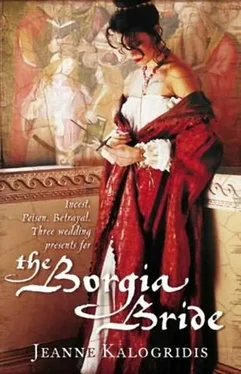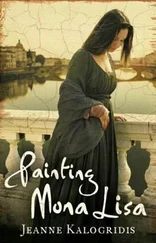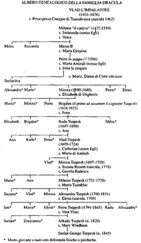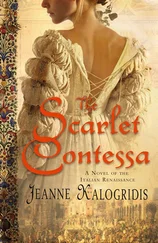I was disappointed to have been left in Isabella’s care, and not my mother’s. My father usually invited my mother, Madonna Trusia Gazullo, a ravishing golden-haired noblewoman, to all functions. He particularly delighted in her company. I believe my father was incapable of love, but certainly he must have come close to it in my gentle mother’s arms.
King Ferrante, however, declared it unseemly to bring my father’s mistress as part of the royal entourage inside a church. Just as strongly, my grandfather insisted that my brother Alfonso and I come. We were children, not to be blamed for the accident of our parentage. After all, Ferrante himself was of illegitimate birth.
For that reason, my brother and I had been raised as royal children, with all rights and privileges, in the Castel Nuovo, the king’s palace. My mother was free to come and go as my father wished, and often stayed at the palace with him. Only subtle reminders from our half-siblings and more pointed ones from our father reminded us that we were lesser creations. I did not play with my father’s legitimate children, as they were several years older, or with my Aunt Giovanna or Uncle Carlo, both close to my own age. Instead, my little brother Alfonso and I were inseparable companions. Though my father’s namesake, he was the opposite: golden-curled, sweet-faced, good-natured, his sharp intelligence remarkably free of guile. He had Madonna Trusia’s pale blue eyes, while I resembled our father to such a striking degree that, had I been a son, we would have been twins separated by a generation.
Isabella led us to an aisle at the front of the sanctuary which had been roped off; even after we had settled into our place in the Duomo, my brother and I continued to clasp hands. The great cathedral dwarfed us. High overhead, the distance of several Heavens, was the massive, gilded cupola, rendered dazzling by the sunlight that streamed in through its arching windows.
The royal men came next. My father-Alfonso, Duke of Calabria, that sprawling, rustic region far to the south, on the eastern coast-led the way. Heir to the throne, he was renowned for his ferocity in battle; in his youth, he had wrested the Strait of Otranto from the Turks in a victory that brought him glory, if not the people’s love. His every move, every glance and gesture, was imperious and forbidding, an effect accentuated by his severe costume of crimson and black. He was more beautiful than any woman present, with a perfect straight, thin nose and high, upward-slanting cheekbones. His lips were red, full, sensuous beneath his thin moustache, his dark blue eyes large and arresting beneath a crown of shining jet hair.
Only one thing marred his handsomeness: the coldness in his expression and eyes. His wife, Hippolyta Sforza, had died four years before; the servants and our female relatives whispered she had given up in order to escape her husband’s cruelty. I remembered her vaguely as frail with bulging eyes, an unhappy woman; my father never failed to remind her of her failings, or the fact that theirs was a marriage of convenience because she came from one of Italy’s most ancient and powerful families. He also assured poor Hippolyta that he took far greater pleasure in my mother’s embrace than in hers.
I watched as he moved in front of us women and children, forming a row directly in front of the altar, to one side of the empty throne that awaited the arrival of his father, the King.
Behind him came my uncles: Federico and Francesco. Then came my father’s eldest son, named for his grandfather, but affectionately called Ferrandino, ‘little Ferrante’. He was nineteen then, second in line to the throne, the second most handsome man in Naples but the most attractive, for he possessed a warm, outgoing nature. As he passed the worshipers, feminine sighs echoed in his wake. He was followed by his younger brother Piero, who had the misfortune to resemble his mother.
King Ferrante entered last, in breeches and a cape of black velvet, and a tunic of silver brocade embroidered with fine gold thread. At his hip was the sheathed, jewelled sword given him upon his coronation. Though I knew him as an old man with a limp exacerbated by gout, on this day he moved gracefully, without any hesitation in his gait. His good looks had been eroded by age and indulgence. His hair was white, thinning, revealing a scalp burned pink by the sun; he had a ponderous double chin beneath his trimmed beard. His eyebrows were dark and startling, especially in profile, due to each thick hair’s attempt to launch itself in a different direction. These stood above eyes strikingly like mine and my father’s-an intense blue with hints of green, capable of changing colour depending on the light and hues surrounding him. His nose was red, pock-marked, his cheeks covered with broken veins. But his bearing was straight, and he was still capable of silencing a crowd simply by walking into a room.
His solemn expression, upon entering the Duomo San Gennaro, generated pure ferocity. The crowd knelt even lower, and waited for the King to settle himself upon a throne near the altar.
Only then did they dare rise; only then did the choir begin to sing.
I craned my neck and caught a glimpse of the altar, where a silver bust of San Gennaro wearing his bishop’s mitre had been placed in front of burning tapers. Nearby stood a marble statue, slightly larger than life, of Gennaro in full regalia, two fingers of one hand lifted in blessing, a crosier resting in the crook of his arm.
Once the King was situated and the choir had fallen silent, the Bishop of Naples emerged and gave the invocation; his assistant then appeared, bearing a silver reliquary in the shape of a lantern. Behind the glass was something small and dark: I could not see clearly from my position, being too short-my view was blocked by the backs of my black silk-clad aunts and the men’s velvet capes, but I peeped in between. I knew it was a vial containing the dried blood of the martyred San Gennaro, tortured, then brutally beheaded on the orders of the Emperor Diocletian over a thousand years before.
Our bishop and the priest prayed. The zie di San Gennaro let out sonorous wails, beseeching the saint. Carefully, the priest, without touching the glass, turned the reliquary end-over-end, one time, then two.
An eternity seemed to pass. Beside me, Isabella had lowered her head and shut her eyes, her lips moving in a silent prayer. On my other flank, little Alfonso had lowered his head solemnly, but was peering out from beneath his curls in fascination at the priest.
I believed fervently in the power of God and the saints to intervene in the affairs of men. Deeming it safest to follow Isabella’s example, I bowed my head, squeezed my eyes closed, and whispered a prayer to Naples’ patron saint: Bless our beloved city, and keep it safe. Protect the King and my father and mother and Alfonso. Amen .
A murmur of awe passed through the crowd. I caught a glimpse of the altar, of the priest proudly displaying the silver reliquary, holding it up for the crowd’s scrutiny. ‘ II miracolo e fatto ,’ he proclaimed.
The miracle is accomplished.
The choir led the congregation in singing the Te Deum , praising God for bestowing this blessing.
From my vantage point I could not see what had occurred, but Isabella whispered in my ear: the dark, dried substance in the vial had begun to melt, then bubble, as the ancient blood once again became liquid. San Gennaro signified that he had heard our prayers, and was pleased; he would protect the city which he had served as bishop during his mortal years.
It was a good omen, she murmured, especially for the King on his anniversary. San Gennaro would protect him from all enemies.
The current Bishop of Naples took the reliquary from the priest and stepped down from the altar to the throne. He held the square, silver-and-glass box before King Ferrante and waited for the monarch to unseat himself and approach.
Читать дальше
Конец ознакомительного отрывка
Купить книгу












